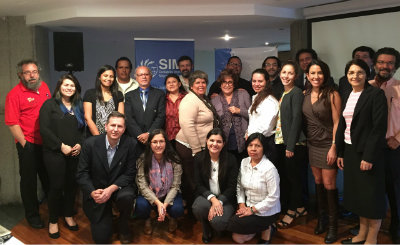Summary and main conclusions available
12 août 2015

With the objective of creating strategic alliances between the Costa Rican civil society organizations and government institutions for the strengthening of public policies that take into account the migration reality in the Central American region and that strengthen the effective dialogue for the due access to justice for migrant people and their families, especially the children and adolescents, asylum seekers and displaced people, the Scalabrini International Migration Network (SIMN), through the Fundación Scalabrini, in coordination with the Centro Internacional de Derechos Humanos para Migrantes (CIDEHUM), on July 8th of 2015, at the Radisson Hotel of San José, Costa Rica, organized a national meeting of policy makers, within the framework of the MADE programme.
The meeting’s main subject was: “La Dignidad de los/las Migrantes: Logros, Dificultades y Desafíos éticos para Construir el Futuro (Migrant People’s Dignity: Achievements, Difficulties and Ethic Challenges to Build the Future).” During the opening session, the Costa Rican Vice-Minister, Mme. Carmen Muñoz, underlined the human rights perspective from which Costa Rica defined its migration policies. Mme. Katthya Rodríguez, General Director of the Migration Department, presented the main achievements in the implementation process of the new migration policy, including the participation from civil society in this process. Then, Mme. Gabriela Richard, Executive Director of CIDEHUM and civil society representative in the Migration National Council in Costa Rica, encouraged the participants to include the regional and international perspective in the country’s public policies, in accordance with the regional and international processes. Mr. Idenilso Bortolotto mentioned the importance of this meeting for the strengthening of the strategic alliances and the civil society organizations networking in coordination with the governments, all in accordance with the MADE objectives.
After the opening session, various State institutions, civil society organizations and international organizations presented the main achievements and challenges in a political agenda on the national, regional and international levels.
The meeting was attended by various social actors, including migrants’ organizations, representatives of the juridical authorities, Defensoría de los Habitantes, Centro por la Justicia y el Derecho Internacional (CEJIL) and UNHCR in Costa Rica.
After each intervention, a time for debate and proposal was allowed, in accordance with the meeting’s objective. Concluding the meeting, Mme. Gabriela Rodríguez and Mr. Leonir Chiarello invited the participants to keep on strengthening the collaboration and the coordination between the civil society organizations, governments institutions and international organizations for the protection of the migrants’ rights and the definition of publics policies and programmes on migration and development from the perspective of the Civil Society’s 5-year 8-point Plan of Action.
For more information:
Access the summary of the main points discussed (English-tbc) (Spanish)